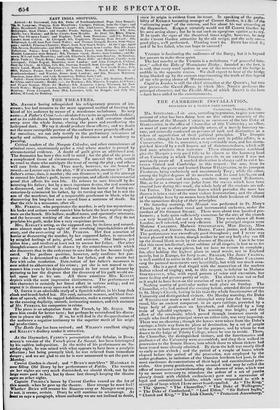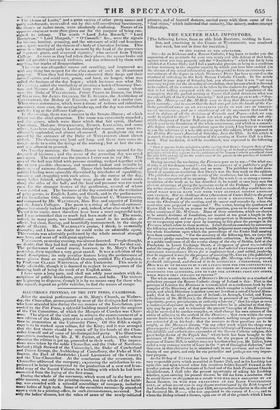THE CAMBRIDGE INSTALLATION,
DESCRIBED BY A VISITER FRO31 LONDON.
CA>ruat DOE, Thurvlay, 9th July.
MR. SPECTATOR—I sit own, according to promise, to give you some account of what has been doing here on this solemn occasion of the installation of the Marquis CAMDEN, as successor of the late Duke of GLIM:a:STEIL in the office of Chancellor of this University; an office, us most of your readers are probably aware, of a merely honorary na- ture, end generally conferred on persons of rank and distinction as a token of approbation of their political principles. The Marquis
is a rquis
CAMDEN, though he has nut taken an active part in public affairs, Conservative. Ile is, moreover, a very estimable man, and has distin- guished himself by a well known act of disinterestedness, which will find more admirers than imitators These circumstances eumbined give the Marquis a very good title to be chosen as the honorery head arm University in which Toryism prevails to an extent I was not previucsly aware of. A smirked distinction is always said to exist be- tweet' Oxford and Cambridge in this respect : the one, from its Chancellor, the grave and learned Doctor WELLINGTON, to its youngest Freshman, being exclusively and unanimously Toy; while the other, among the higher degrees of its members and its most intelligent and valuable professors and teachers, numbers many sound Itt formers. But, as far as a stranger can judge from the scenes which have been enacted here during this week, the whole body of the students are red- hot Tories. The Conservative leaven which pervades the mass has thrown it into a state of the most violent fermentation ; and the alumni of Cambridge have by no means been behind their brethren of Oxford in the uproarious display of their principles. On Saturday morning, the M"essiali was performed in St. Mary's Church, by un excellent vocal and instrumental orchestra, under the. conduct of Sir Geonee SMART. There were about two hundred per- formers; a body quite sufficiently numerous for the size of the church —a very beautiful, but not a large one. They were almost all from London, well selected, and very efficient. The principal singers were Madame CARADORI, Madame STOCKHAUSEN, Miss Bocce, Miss IVAGSTAFT, and Messrs. SAM, HOBBS, PARRY junior, and Mscinst. The performance was exceedingly good throughout ; and I never was better pleased with SAPID, though neither he nor any body else can fill up the dismal blank made by the absence of Baaeast. Can it be tree that this most intellectual, most sublime of all singers, is lust to us for ever? If it is, we may grieve, but we have no season to complain ; for, after holding the highest place in vocal music, not in England merely, but in Europe, for forty years, linsnase like Jolty CRAMER, is well entitled to retire in the midst of his fame. Madame CARADOR1 sang the pastoral movements very beautifully, but with too much orna- ment. She is a good deal tinged with the mannerism of the modern Italian school of singing; and, in this respect, is inferior to Madame STocenausee, who, with equal powers of voice and execution, has more feeling and greater purity of style. The church was not so full as it ought to have been on the occasion of such a performance.
Nothing worthy of particular notice took place on Sunday. The Chancellor, who had arrived the evening before, attended divine service in St. Mary's Church, having in his trian the whole functionaries of the University and distinguished visitors. Ott Monday morning, the Duke of WELLINGTON made a sort of triumphal entry into the town. He stood, like an ancient conqueror, in an open carriage, preceded by a large body of gentlemen on horseback, and followed by a long
train of splendid equipages. The morning was bright; and the effect of the cavalcade, which passed through immense crowds of people who lined the principal street on either side, was very imposing. There was no cheering; though the horses were taken from the Duke's nu-tinge, a little way from its place of destination, by a set of people who seem to have been provided for the purpose, and by whom lie was drawn to the lodge of Trinity College, where he was to reside. There, the Chancellor, the distinguished visitors, and the functionaries and graduates of the University were asssembkei; and they then walked in procession to the Senate House, into which those to whom tickets had been issued were already admitted. By them the hall was nearly filled so early as ten o'clock ; and the period of a couple of hours which elapsed before the arrival of the procession, was employed by the under-graduates, in imitation of the Oxonian brethren last year, in the most vociferous demonstrations of their loyal and constitutional prin- ciples. One young gentleman, who assumed what may be called the office of toastmaster (notwithstanding the absence of wine, which was by no means necessary to stimulate the ardour of a set of youths already drunk with childish enthusiasm) gave out a succession of loyal and constitutional healths, which were responded to with a strength of lungs which I have never heard equalled. As " The King," " The Queen," " The Chancellor," " The Duke of Wellington," " The Duke of Cumberland," " Lord Eldon," " Sir Robert Inglis," " Church and King," " The Irish Church," " Protestant Ascendancy," it TIN. 1 I nose of Lords," and a great variety of other Imlay names aud party watehwords, were called out by this self-coestituted functionary, the show, or rather roars, were absolutely deafening. Names of en opposre eharamer were then given out for the purpose of being con-
aigoed to infamy. The words " Lord John Russell, " Lord Botehant," " Lord Morpeth," " O'Connell," gm., were the signals
for me. hooting, groaning, and the utterance of wild and Imo-elms tears. (olio; worthy of the throats of a body of Cherokee Indians. This seem. w ;nterrupted only for a moment by the head of the procession of potent. grave, and reverend signiors," who arrived from Trinity College. As soon as they had taken their places, the uproar broke out with ( if possible) increased violence, and was witnessed by them with Any, h111,4 but marks of disapprobation. 1 he seene was altogether coarse :Ind revolting, and impressed me with any thing but respect for the emu muter of such an all-nurtured prommy. When they had thoroughly exhausted their lungs and their anintol spirits. and could roar, groan, and hoot, no longer, what was tallied the business of the day began ; which business was what Mr. p'Yae!:Niei i. called the tomfoolery of creating a batch of honorary Doc- tors ,Ind Masters of Arts. About forty were made ; among whom were the Duke of WELLINGTON, Prince Pozzo m BORGO, the Duke ofG !tee roN, Sir JAMES GRAHAM, Sir E. SCGDEN, the Archbishop of CANTERBURY, the Bishop of EXETER, and others of a similar cast. When these ceremonies, which were it tissue of tedious and ridiculous mummery. were over, the meeting broke up, and the day was concluded with fee trig at the different Colleges.
In r he evning, there was a concert in the Senate-House ; of which
R! SI kviis the chief attraction. The room was excessively crowded ; and the pccees, which were those which that fair syren, Madame Can e mein Madame STOCKHAUSEN, RUBIN!, LABLACIIE, and some Other-, have been singing in London during tire season, were most vo- eifetottOy applauded, and almost all encored. A prodigious stir was caused by the entrance of the Duke of WELLINGTON about eleven &chick. The cheering was loud and long, and there were some at- temot, aside to revive the doings of the morning; but at lust the con- cert ye, s :,Ilowed to proceed. "Fmaday morning, the Senate-House was again opened for the des; ,trek of business ; and the scene of the preceding day was acted over again. The crowd was the greatest I ever saw in my life. The area a the hall was filled with persons standing, wedged together with the at nest possible closeness, and rendered violent and irritable by their stem of extreme discomfort. Hence their boisterous effusions of politic.,] feeling were agreeably diversified by interludes of squabbling, :sweat ieg, and struggling with each other. In the course of the day, many ladies fainted, although they were placed on the raised seats along the sides of the hall ; and the heat and pressure was too much even for the stronger frames of the gentlemen, several of whom I saw esnied out. The business of the day consisted in the recitation of prize poems, in English, Latin, and Greek, and in the performance of the Installation Ode, written by the Reverend C. WORDSWORTH, and composed by Mr. WatotsLEo, Mus. Bac. and organist of Trinity and St. Jobn's Colleges. The poem is a string of classical common- places ingeniously tacked together ; and, indeed, what else could it be ? To set it to music, must therefore have been a most ungrateful task; and I was astonished that so much had been made of it. The music, indeed, in many parts, was beautiful—not novel in its melodies or offeets, but clear, flowing, and beautifully instrumented, in the simple style of HAYDN. Mr. WALMISLEY'S genius, I think, is essentially dramatic ; and I have no doubt he could write an admirable opera. This eentata was admirably performed by the whole musical strength now here, and went off with great applause. The cncert, yesterday evening, was almost deserted. People thought, no doubt. that they had had enough of the Senate-house for that Gay. The performance of sacred music, however, in St. Mary's Church yesterday, drew together a very great crowd. It was a selection of the usual description ; its only peculiar feature being the performance of some pieces from an unpublished Oratorio, entitled The Crucifixion, by Professor CLARKE WHITFIELD, of this University. This music is truly admirable, though it is doomed to neglect in consequence of the damning fault of being the work of an English artist.
I have spun a long yarn, and shall not edify your readers with de- scription!: of public breakfasts, great dinners, and balls. The visiters are beginning to disperse, though it is by no means easy for those who, like myself, depend on public vehicles, to find the means of escape.



























 Previous page
Previous page